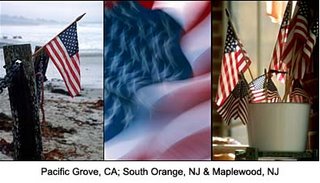In the Summertime When The Weather Is Hot...
 If you’re old enough to remember, (ahem) if you’re old enough to remember, you’ll recall a Mungo Jerry song (they were one of rock ‘n’ roll’s all-time great one-hit wonders) called, “In The Summertime.” This is a song known by those who weren’t even born when it was released. Anyway, “in the summertime,” as the song goes, “when the weather is hot you can reach right up and touch the sky...”
If you’re old enough to remember, (ahem) if you’re old enough to remember, you’ll recall a Mungo Jerry song (they were one of rock ‘n’ roll’s all-time great one-hit wonders) called, “In The Summertime.” This is a song known by those who weren’t even born when it was released. Anyway, “in the summertime,” as the song goes, “when the weather is hot you can reach right up and touch the sky...”  Some summers though, when the weather is hot the sky reaches down and touches you. We’re having such weather in the New York City area now: hot & oppressively humid, sticky, uncomfortable to the max and going on four days. Luckily, I’m not shooting today and I have the refuge of a nice air-conditioned office in which to work fairly leisurely.
Some summers though, when the weather is hot the sky reaches down and touches you. We’re having such weather in the New York City area now: hot & oppressively humid, sticky, uncomfortable to the max and going on four days. Luckily, I’m not shooting today and I have the refuge of a nice air-conditioned office in which to work fairly leisurely.A couple of summers ago, in weather not unlike today’s, I was busy photographing the excavation of Feltville in the Watchung Reservation. The reservation is a lush, heavily wooded, 2000 acre nature preserve in the Watchung Mountains and because the trees are so... thick... the forest holds the humidity close to the surface. If you’re working there, you’re wet (in fact, if you’re doing anything there, you’re wet!).
 My assignment was for American Archaeology magazine and I was covering the activities of a crew from Montclair State University under the direction of Matt Tomaso. They were completing an archaeological survey, testing and excavation, with geoarchaeology and laboratory components, conducted in a 19th century industrial utopian village (on the National Register of Historic Places) called “Feltville,” after its founder, Daniel Felt. Amazing stuff, really, and that’s one of the things I like best about what I do. I get to see some amazing stuff from the inside.
My assignment was for American Archaeology magazine and I was covering the activities of a crew from Montclair State University under the direction of Matt Tomaso. They were completing an archaeological survey, testing and excavation, with geoarchaeology and laboratory components, conducted in a 19th century industrial utopian village (on the National Register of Historic Places) called “Feltville,” after its founder, Daniel Felt. Amazing stuff, really, and that’s one of the things I like best about what I do. I get to see some amazing stuff from the inside. Of course, one of the things I like least about what I do is that I may have to do it in 100% humidity. This is when photography is a job as opposed to an adventure (well, it’s still an adventure but it feels like a job).
Of course, one of the things I like least about what I do is that I may have to do it in 100% humidity. This is when photography is a job as opposed to an adventure (well, it’s still an adventure but it feels like a job).Despite the humidity, Feltville was a very cool assignment. Some of the old buildings are still standing and some are gone. There’s the deserted cemetery of the Willocks & Badgley families with graves dating to the American Revolution. The team also excavated a wealth of artifacts from what amounted to the basements of houses which long ago disappeared into the ground.
If you live in the area, you should take your kids to see the Deserted Village of Feltville... in October... when it’s dry!

































